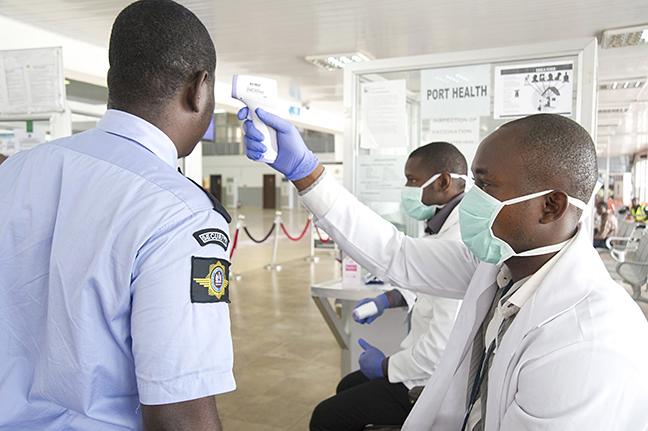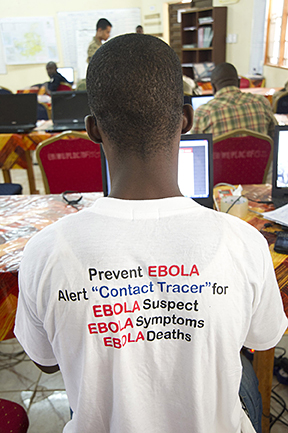You are here
Seeing Progress on the Ground in West Africa: In Sierra Leone
This is the second blog post from a CDC Foundation trip to West Africa. On this trip, Charlie Stokes, president and CEO of the CDC Foundation, and two team members are looking at the Ebola response work funded through the CDC Foundation by private sector donors.
Today our team left Guinea and headed to Sierra Leone, the second stop on our trip to West Africa. In recent months, the Ebola epidemic has heated up in Sierra Leone with a spike in the number of cases. Public health workers here are working diligently to turn the tide of the epidemic.
 Our group flew into Freetown, Sierra Leone’s capital, from Conakry, Guinea, which is only a short 30 minute flight—but a six hour drive over rough roads, even in the dry season.
Our group flew into Freetown, Sierra Leone’s capital, from Conakry, Guinea, which is only a short 30 minute flight—but a six hour drive over rough roads, even in the dry season.
We were met at the Freetown-Lungi International Airport by a team that screens all passengers leaving through the country’s primary airport. The team is funded through private-sector donations to the CDC Foundation and is being managed by the International Organization for Migration, which is working closely with the U.S. Centers for Disease Control and Prevention (CDC) team in Sierra Leone. Stay tuned for a more detailed article on this team’s critical work that is protecting the people of Sierra Leone and the world from the spread of Ebola.
Later in the day, our team traveled to Port Loko district health coordination facility. Port Loko is in the northern part of Sierra Leone. We spoke with staff at the facility who are preparing for an Ebola vaccine trial. The CDC Foundation’s donor funding is allowing preparatory work, such as surveys and focus groups required for the trial, so that preparation for this trial can begin before U.S. government funding becomes available. In Port Loko, we also saw some of the pick-up trucks donated by the CDC Foundation in action. CDC identified that having more vehicles was a critical need for the Ebola response and especially needed to access hard-to-reach rural areas. To meet the needs, the CDC Foundation secured funding to purchase the vehicles. The 206 donated trucks—24 in Sierra Leone—are being used for a variety of purposes, from contact tracing (tracking the contacts of those infected) to transporting patients, to burial teams.
 This evening, we arrived in Bo, which is the second-largest city in the country and a three- to four-hour drive from Freetown. In Bo, CDC operates one of the primary labs for conducting Ebola tests. These tests determine whether patients or deceased individuals have the Ebola virus, which provides essential information used to help trace the spread of the disease and ultimately stop the epidemic.
This evening, we arrived in Bo, which is the second-largest city in the country and a three- to four-hour drive from Freetown. In Bo, CDC operates one of the primary labs for conducting Ebola tests. These tests determine whether patients or deceased individuals have the Ebola virus, which provides essential information used to help trace the spread of the disease and ultimately stop the epidemic.
Sierra Leone, Guinea and Liberia have borne the brunt of the Ebola epidemic and courageous and dedicated public health workers from these countries and around the globe are working to end the epidemic. Being here, one cannot help but feel deep gratitude for the sacrifices these individuals are making and intense respect for the determination with which they go about their jobs.
Also, being on the ground, I feel an even greater sense of appreciation for the generous contributions made by the many individuals, foundations, corporations and others to the CDC Foundation to help extend the work of CDC and its partners in West Africa. We continue to hear how these contributions have made a very real difference—a difference that is saving lives.
Photos: ©David Snyder/CDC Foundation